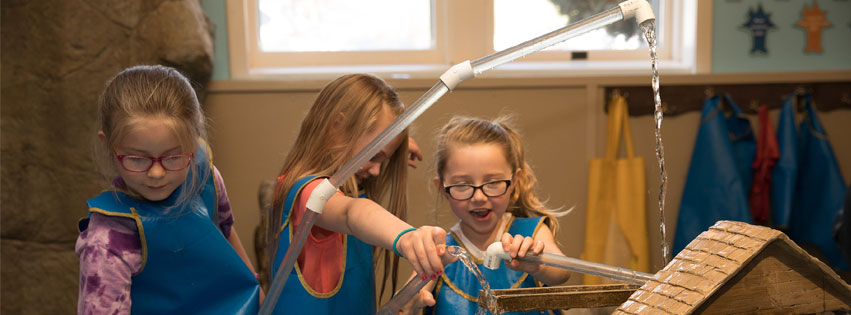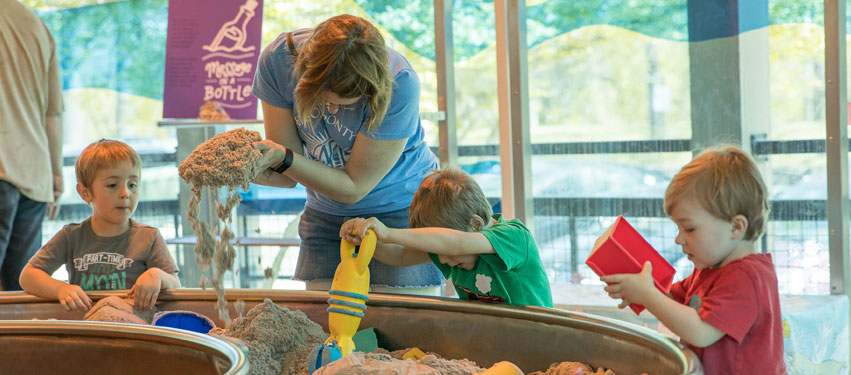Cultivating Tomorrow’s Leaders

In order to become tomorrow’s leaders, children need to develop emotional intelligence.
Children often take on the roles of “leader” or “follower” in play— we can all remember one child bossing others around during a game. But bossiness is different than leadership, which involves visioning, change-making and engaging others in the work. While not everyone will (or should) grow up to be a leader, leadership ability helps many people to be fulfilled in their work and personal lives—and to make change in their world.
There are many theories about how to identify leadership skills, how to teach leadership skills, or if they can even be taught. Over the past few decades, research has shown that the strongest indicator of successful leadership is “emotional intelligence.” Thus, in order to become tomorrow’s leaders, today’s children need to develop emotional intelligence.
Play, it turns out, can help children develop emotional intelligence. The Montessori Method of education refers to play as children’s “work,” which captures the importance of play in helping children develop the skills they will need later in life. In fact, many things are much easier to learn as a child because children are more malleable than adults, and this may extend to leadership skills as well.
What Is Emotional Intelligence?
In the 1990s, Daniel Goleman, a science reporter for The New York Times, began writing and sharing research about emotional intelligence, showing that it is the best predictor of leadership ability. Although sometimes seen as too emotional or “touchy-feely,” interest in emotional intelligence, often called “EQ,” quickly took off. The past few decades have seen countless books and articles on this subject.
Malcolm Higgs, a business professor at the University of Southampton, defines emotional intelligence as: “achieving one’s goals through the ability to manage one’s own feelings and emotions, to be sensitive to, and influence other key people, and to balance one’s motives and drives with conscientious and ethical behavior.” EQ has four domains: self-awareness, self-management, social awareness and relationship management. All of this boils down to two primary skills: the ability to understand and manage one’s own emotions, and the ability to read and respond to the emotions of others. The first step in building these skills—and the steps important when thinking about leadership and children—are to develop self-awareness and empathy.

The Role of Play
Play is generally understood as any activity that children choose to engage in for its own sake. Children learn all sorts of things through play, including skills in the cognitive, social, emotional and physical realms. This includes language, problem-solving, negotiation, how to draw and jump and run, and more.
In a review of research on the evolutionary role of play, Peter La Freniere identifies play as “an opportunity to hone emotion-communication and emotion-regulation skills.” This is the first step in developing EQ: being aware of and in control of one’s emotional response, and being able to convey and communicate about one’s emotions and the emotions of others.
Studies also demonstrate the role of play in cultivating empathy in children. One 1998 study by Claire Hughes and Judy Dunn from the Institute of Psychiatry demonstrated that when four-year-old children play and talk together, they build their skills in communicating their emotions, learn to better understand the emotions of others, and develop mutual understanding.
Helping Children Become Leaders
At the Peoria PlayHouse Children’s Museum, a Peoria Park District facility, we regularly watch children learning to collaborate, negotiate and share. We are honored to partner with parents and caregivers in helping children find spaces and situations in which to develop these social skills.
Parents and caregivers play key roles in helping children develop EQ. Here are a few ideas from the research:
- Make sure your child has ample time to play with other children. One-on-one or small group interactions with the same child(ren) is shown to help children develop empathy;
- When children fight or get frustrated, take the time to talk to them about how they feel—and how others might be feeling;
- Offer your child the opportunity to engage in role-playing—trying on costumes or taking on the role of a favorite television or storybook character; and
- Model EQ. Identify the emotions of others when they impact the mood in the house, and talk to your kids about your own emotions. iBi
Thanks to Derek Montgomery and Amy Beckes for sharing some of the research that informs this article.

